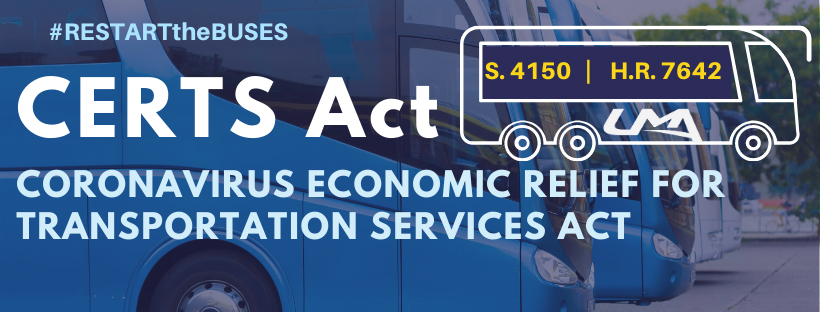- Details
- Category: Industry News
The American Bus Association (ABA) has announced the winners of several of its awards.
First, the Motorcoach Driver of the Year award recognizes an individual who has gone above and beyond the performance of his or her duties as an over-the-road motorcoach driver, professionally executing safe motorcoach operation, while providing the traveling public with the safest form of passenger transportation in the United States. This year's award was presented to Mohammad “Raja” Ishtiaq.
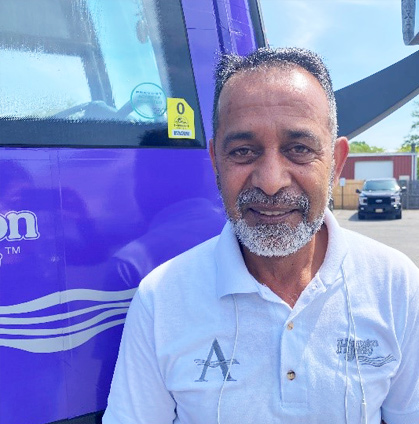 2021 Motorcoach Driver of the Year: Mohammad “Raja” Ishtiaq
2021 Motorcoach Driver of the Year: Mohammad “Raja” Ishtiaq
Ishtiaq of Riverhead, N.Y., was selected from among numerous qualified nominees from across the country as the 2021 Motorcoach Driver of the Year. With nearly 3 million miles logged in his career, Ishtiaq is known for his driving skill as well as his considerable customer service.
“Motorcoach drivers are the face and backbone of our industry,” said ABA President & CEO Peter Pantuso. “They deliver millions of passengers safely each year to their destinations providing top notch customer service. They are truly the representatives of our member companies and the industry. People always remember their driver and the experience they had with them on a trip. We are happy to not only recognize a deserving driver annually, but particularly in a time when driver recruitment and retention is such a challenge, we have put out new resources to help in that battle. Hopefully this award, is just one more visible incentive to help a company along the way to recruiting quality drivers.”
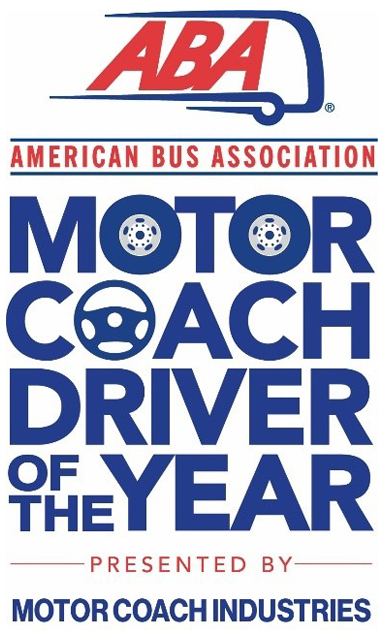
Hampton Jitney Vice President Andrew Lynch called Ishtiaq’s driving record “unmatched” over the company’s 45-year history and noted that “[Ishtiaq’s career] is a track record of not only skill and safety in the driver’s seat, but of courtesy and caring towards our customers that has repeatedly been recognized by our ridership.”
Company President Geoff Lynch nominated Ishtiaq for the award because of his professionalism, dedication, extensive driving skills, and knowledge of the industry.
“Raja has been a resource to everyone in our organization,” Lynch said. “He’s been involved with our driver training program for more than 20 years, serves as a mentor to all our other drivers, is a 19A certified observer and is the driver called to handle any type of difficult maneuver. He has even been called on by other companies to help navigate New York City. One time, a visiting company had an articulated bus in town, and they needed the best driver in the city to help them out of a jam, so they asked for Raja.”
The award, which is sponsored by Motor Coach Industries, was announced during a virtual ceremony held June 15 online, a formal presentation will take place at the annual ABA Marketplace event on January 10, 2022, during the largest gathering of motorcoach operators in North America. Over the course of his career, Ishtiaq has earned received every single annual safe driving award there is at Hampton Jitney, since 1991.
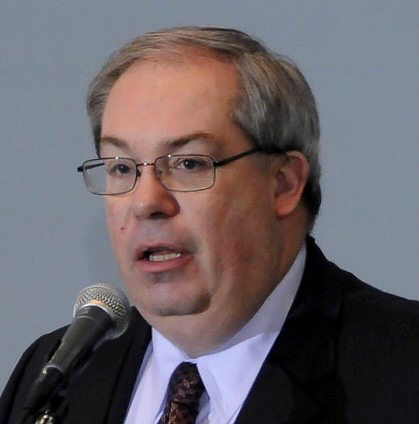 Norm Littler Memorial Safety Award winner: Mike McDonal of Saucon Technologies
Norm Littler Memorial Safety Award winner: Mike McDonal of Saucon Technologies
In other news, the ABA and its Bus Industry Safety Council (BISC) announced the winner of the prestigious Norm Littler Memorial Safety Award: Mike McDonal of Saucon Technologies in Bethlehem, Pa.
The Norm Littler Memorial Safety Award recognizes an individual or organization that has made significant contributions to the profession of safety through the development or implementation of techniques, products, or safety processes and demonstrates a commitment and investment in the day-to-day safety of the traveling public by motorcoach.
McDonal has dedicated more than 35 years to the transportation industry, more than 15 of which has been with the motorcoach industry. A longtime fixture within Maryland transportation circles, McDonal became well known to the motorcoach industry during his time with Eyre Bus, Tour & Travel based in Glenelg, Md. During his time with Eyre, McDonal got heavily involved with a variety of industry organizations, including BISC where he served in a multitude of leadership roles, including a term as Chair. He also emerged during that time as a recognized national speaker on motorcoach safety issues, as well as a “go-to guy” on compliance and training issues.
In addition to his service to BISC where he continues to be involved with the organizational leadership, McDonal approached ABA in 2015 about a gap in its safety education offerings and recommended that maintenance be given some additional attention, leading to the creation of Bus Maintenance and Repair Council, where he serves as Chair.
The award was announced during a virtual ceremony held June 15 online, a formal presentation will take place at the annual ABA Marketplace event on January 10, 2022, during the largest gathering of motorcoach operators in North America.
Still active in the industry, McDonal joined Saucon Technologies as the director of Regulatory Compliance in 2015. In his role at Saucon, McDonal has been instrumental in the implementation of the new electronic logging device regulations in both the US and Canada. He also continues to assist motorcoach operators daily, not only with telematics-related concerns or safety monitoring, but also as a mentor and trusted advisor. He took a leading role in helping to develop the first formal mentorship program for the motorcoach industry through BISC, in large part based on his own personal experiences mentoring people in the industry.
“Mike has been a fixture and standard bearer for motorcoach safety in our industry for many years,” said Pantuso. “He has been a valued expert that almost every company or organization calls on or knows to ask about when they have a question or need advice. He truly embodies all the qualities and enthusiasm that Norm brought to our industry and specifically to safety.”
The award’s namesake, Norm Littler, was in the bus and motorcoach industry for more than four decades and served as ABA’s vice president of regulatory affairs and executive director of the Bus Industry Safety Council before his passing in 2013. He was known for his accessibility, frequently offering guidance and advice on safety, security and regulatory issues.
Visit www.buses.org for more information.
[06.29.21]
- Details
- Category: Industry News
By Matt Daus
 Matt Daus of Windels Marx
Matt Daus of Windels Marx
In a long-awaited journey from passage of the bill at the end of 2020 to the opening of the application portal on June 19, motorcoach operators are finally able to apply for the Coronavirus Economic Relief for Transportation Services (CERTS) Act program. Applicants will have only four weeks to submit their grant applications—closing 11:59 p.m. ET on July 19. Applications will be reviewed and approved in the order submitted. In other words, the sooner companies submit, the better. The program does not allow applicants to request specific grant award amounts; instead, the grant award will be based on the total applicant pool. The great news is that CERTS grants are non-competitive, which means all eligible companies that submit by the deadline and are approved by Treasury will receive a grant award. This is a big deal for transportation service providers, as this is funding that companies will not have to pay back at any point in the future. The goal of the CERTS Act program is to make transportation service providers whole again, as much as that is possible, after the unexpected and difficult circumstances faced in 2020 due to the pandemic.
“Applicants will have only four weeks to submit their grant applications—closing 11:59 p.m. ET on July 19. Applications will be reviewed and approved in the order submitted.
Who is Eligible for CERTS Act Grants?
Based on the final language in the guidelines, the CERTS program is for motorcoach, school bus, passenger vessel, and pilotage vessel transportation service providers who were in business on March 1, 2020. The eligible transportation service provider must have experienced a revenue loss of 25 percent or more between calendar year 2019 and 2020 as a direct or indirect result of COVID.
The eligible transportation service provider will have either:
- 500 or less employees (full-time, part-time or temporary), and not be the affiliate, subsidiary or parent to any other entity with more than 500 employees; or
- 500 or more employees (full-time, part-time or temporary), and not received a loan under the Airlines Loan Program or the National Security Loan Program under the CARES Act.
Treasury will review and consider any COVID federal assistance the company has received and subtract that amount from the overall revenue loss in 2020. A company is ineligible if the COVID federal assistance already received exceeds or equals the total amount of revenue earned in calendar year 2019. This includes assistance provided under the CARES Act, PPP, or any other COVID relief program funds. Participation in these federal assistance programs does not disqualify the company unless the other COVID assistance amounts to more than the total revenue earned in 2019.
Example: If Bus Company A made $100,000 in 2019 and only $50,000 in 2020 due to COVID, the amount of revenue lost from 2019 to 2020 is $50,000, or 50 percent. During 2020, the business received a PPP loan for $20,000. When considering eligibility for CERTS, Treasury will consider Company A’s total loss in 2020 of $50,000 minus the PPP loan of $20,000, making the maximum grant consideration $30,000 (based on current guidelines). CERTS guidelines do not specify whether the Treasury will consider only the forgivable portion of any COVID federal assistance received.
Motorcoach & School Bus Company Eligibility
To qualify as a motorcoach transportation service provider, a company must be registered as an interstate carrier at the federal level or an intrastate carrier at the state level and provide passenger transportation services. A company must have at least one over-the-road bus that it uses in its principal business operations, and must operate its vehicles on a fixed route, commuter service, tour, or charter service model.
Under the recently released Treasury guidelines, the requirements to qualify as a school bus transportation service provider were significantly updated and changed. Under the May 6, 2021 guidelines, a school bus company was to provide its USDOT registration number, for the Treasury to validate the company with the Federal Motor Carrier Safety Administration (FMCSA). If the school bus company did not have a USDOT registration number, Treasury was to review the state registration number or other unique identifying number issued by the state or local agency. A school bus company was also required to provide a copy of its primary or largest contract(s) with a school, school districts, or state department of education for which it provides transportation services. A school bus company might be required to submit additional information to help determine eligibility, such as the vehicle license plate numbers for its school buses and the customer names, points of contact, and contract service periods for the school bus contracts upon request by the Treasury.
Under the June 17, 2021 guidelines, a school bus company must provide a current certificate of insurance with liability coverage as a school bus company, which describes operations as school bus transportation of students. The Treasury will rely on this information to validate the school bus company in addition to a sampling of the VIN, license plate numbers, and model years for a limited number of the company’s school buses and the name of a school, school district, or state department of education which the company provided school bus services for. School bus services includes transporting students to and from school and/or for education-related events in or after 2019. These updated guidelines no longer require a USDOT registration number, although a company may still provide one if the company is registered with FMCSA. The updated guidelines no longer limit eligibility to school bus providers with long-term contracts with a school or school district which in turn widens the applicant pool.
Each CERTS application must be linked to a federal tax return. All information reported on the application must match the information reported on the linked federal tax return. The primary factor in calculating the grant amount will be the difference in total annual revenues reported on the 2019 and 2020 tax returns. Companies that applied for and were granted an extension to file 2020 tax returns are also eligible to apply as long as they demonstrate that extension paperwork was filed.
Limousine and Black Car Companies May Also Be Eligible
Although the CERTS grants don’t apply to companies operating sedans, SUVs, and limousines, it could apply to those that generate the most revenue from either motorcoach services or school bus services. Treasury will review the company’s completed application and determine the principal business that the company is engaged in. If the application for CERTS is approved by Treasury, the CERTS grant can be used for allowable expenses in any part of the company’s business including black car and limousine related expenses.
Companies in Bankruptcy
With the slow rollout of federal aid, many companies were forced to shut down. Luckily, CERTS does not immediately disqualify transportation service providers that have filed for bankruptcy. If a company remains operational, or is no longer operational but not out of business, has met all other CERTS Act requirements, and is in bankruptcy under Chapter 11, the company is eligible for CERTS Act funds so long as the bankruptcy was filed after March 1, 2021. If a company is out of business, dissolved, or filed for bankruptcy prior to March 1, 2021, the company is not eligible for CERTS grants. Those in Chapter 7 bankruptcy are also not eligible.
Using CERTS Funds
Unlike PPP loans, CERTS funds have a wider range of allowed uses. These monies are intended to cover payroll costs; the acquisition of services, equipment, PPE, and protection measures from COVID for workers and customers; continued operations and maintenance of existing equipment and facilities; rent; leases; insurance; and interest on regular debt service.
Funds will be distributed equitably among the four eligible transportation industries based on an analysis of their industry size and cost structure. Fund allocation will be determined after the application period closes on July 19, 2021, and based on actual data from eligible applicants in the pool. The grant-sizing formula (determined by Treasury) will set minimums and maximums for the awards, although the primary factor in grant-sizing will be the company’s lost revenues from 2019 to 2020 and will not exceed the total revenue earned by the company in 2019.
Register and Apply
The portal will be open for a total of four weeks, closing on July 19, 2021 at 11:59 p.m. Eastern Time. To apply, interested companies should register to obtain an ID.me username and password. Companies can also register for updates directly from the Treasury.
Gather copies of your tax returns, income statements, and payroll information for the years 2019 and 2020, as well as any prior COVID federal aid received including EIDL, PPP, Main Street Lending Program loans, and any other COVID-related grant or loan. Given the more flexible allowed use of the grants, the time and effort to prepare a CERTS application is likely worthwhile.
For assistance in completing the CERTS applications beginning to end, for review of your draft application before submitting, or just to ask any questions whatsoever, contact me at mdaus@windelsmarx.com or at 212.237.1106.
[06.28.21]
- Details
- Category: Industry News
The U.S. Travel Association (USTA), which launched its Let’s Go There campaign earlier this year, is now turning its eye to the beleaguered meeting industry. As domestic travel heads toward full recovery of its pre-pandemic numbers, the work isn’t done until other segments of travel are also seeing similar gains.
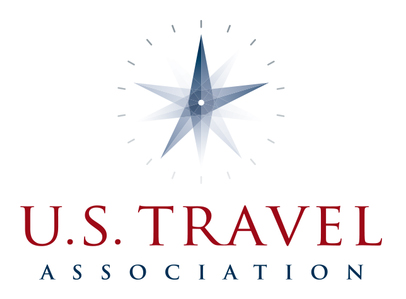
As such, USTA has launched its Let’s Meet There, a campaign that targets the struggling business travel and professional meetings and events (PMEs) sectors. According to data from the association, the US saw a decline of more than $200 billion last year in direct spending generated from business travel (of which roughly $100 billion was directly due to declines in meetings and events), leading to the loss of nearly 1.5 million jobs and $28.8 billion in tax revenue.

The segment’s revival is crucial to chauffeured transportation's long-term health as well as the overall travel economy. Business trips account for a majority of air travel and lodging, with 500 million trips taken in 2019 alone, representing 2.5 million American jobs and a massive $348 billion in spending. Polls show, including those from the Global Business Travel Association, show that business travelers are itching to get back on the road, and that their employers are steadily moving toward it. This campaign aims to convince reluctant C-suite executives that travel is imperative to company success as face-to-face meetings tend to be more productive and business-building than phone calls or even video conferencing.
 U.S. Travel Association President & CEO Roger Dow
U.S. Travel Association President & CEO Roger Dow
According to the campaign’s website: “Let’s Meet There will seek to elevate the economic importance of PMEs—and the fact that it is possible to resume PMEs safely—to state and local policymakers, as well as the Centers for Disease Control and Prevention, to encourage a reassessment of guidance for PMEs. As stated in a review of current best evidence led by scientists at The Ohio State University, PMEs have the advantage of being structured and well-organized large gatherings where mitigation factors can be enforced to protect the health and safety of those in attendance.”
“We have a lot of work ahead of us, but I am confident that we can accelerate the recovery of this crucial sector of the travel economy,” says USTA President & CEO Roger Dow. “The same energy, focus, and collaboration that made Let’s Go There such a great success will carry the Let’s Meet There campaign through this next chapter. I am looking forward to continuing working with all of our partners and know this will be an important part of our industry’s comeback story.”
Visit ustravel.org or letsmeetthere.travel for more information.
[06.29.21]


